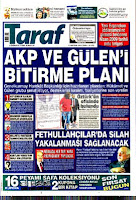Betül Akkaya Demirbaş
It has been one year since the exposure of a suspected military plan to undermine the Justice and Development Party (AK Party) and the faith-based Gülen movement, which was hoped would lead to a coup d’état, and Turkey has witnessed many attempts -- not only from the military but also from the media and the judiciary -- to discredit an ongoing civilian probe into the plan.
On June 11, 2009, the liberal Taraf daily printed documents seized in the office of Serdar Öztürk, the lawyer of a retired colonel arrested last year on charges of membership in Ergenekon, a clandestine criminal organization charged with plotting to overthrow the government.
The documents, prepared in April, included a detailed plan believed to be drawn up by Col. Dursun Çiçek and submitted to a department of the General Staff. The plan was titled the Action Plan to Fight Reactionaryism.
The documents revealed that the Turkish Armed Forces (TSK) had a systematic plan to damage the image of the AK Party government and the Gülen movement -- inspired by internationally respected Turkish scholar Fethullah Gülen -- in the eyes of the public, to play down the Ergenekon investigation and to gather support for members of the military arrested as part of the inquest.
Prosecutors overseeing the Ergenekon investigation immediately launched a probe into the alleged coup plan, but faced many obstacles they never imagined. Attempts to discourage the prosecutors regarding their probe and discredit their findings matched indeed, word for word, a “General Staff plan” disclosed by an unidentified military officer. In a letter he sent to Ergenekon prosecutors in the aftermath of the discovery of the subversive military plot, the officer warned that the military would do its best -- in cooperation with the media and the judiciary -- to discredit and later quash the civilian probe into said plot.
Recent developments have shown that the plan ran like clockwork and that all of its phases have been completed.
According to the plan, as the officer put forward, press organs would incite a heated debate over the authenticity of the action plan, propaganda would be disseminated to wear down the institutions that confirmed the authenticity of the plan, opponents of a civilian probe into the plan would claim that the signature on the plot document was fabricated using a signature machine, a military investigation would focus on who “disclosed” the document rather than who prepared it and the General Staff would place the blame of the plot on Çiçek if it failed to persuade the public that the document was false.
As the first phase, as soon as the action plan found wide coverage in the media, some press organs focused on the authenticity of the plan rather than its horrifying content. Based on statements by the General Staff, they refuted the existence of such a plan and argued that it was fabricated by opponents of the military with the motive of undermining the power of the armed forces. For them, the plan was part of the psychological warfare against the TSK.
At this phase, they depended on a machine that can reproduce a genuine signature to justify their claims that a “wet signature” that appears on the action plan does not actually belong to Col. Çiçek. The colonel is currently in prison on coup charges. He faces a life sentence without the possibility of parole.
In an attempt to put an end to ceaseless debates over the authenticity of the action plan, many institutions examined the original copy of the action plan and concluded that the signature on the document is the product of Çiçek’s hand. Among them are the İstanbul Council of Forensic Medicine (ATK), the Scientific and Technological Research Council of Turkey (TÜBİTAK) and the İstanbul Police Crime Laboratory. Also in March, the Gendarmerie General Command’s Criminal Investigation Department announced that the signature that appears on the document belongs to Çiçek.
Deniers of the plot were not satisfied with those findings, though, and continued their propaganda against the authenticity of the plan.
Who prepared the plan or who disclosed it?
The alleged General Staff plan later jumped to the next phase, which included a “witch hunt” of who disclosed the action plan to Taraf and civilian prosecutors rather than who prepared it.
In late October, the TSK announced that it launched a new investigation into the Action Plan to Fight Reactionaryism. The General Staff’s Military Prosecutor’s Office examined said document and sought to clear up questions in people’s minds. In time, the investigation turned its focus on to discovering who sent the original plan to the prosecutors and the daily rather than revealing how and why the plan was prepared. The Military Prosecutor’s Office started to interrogate staff at Çiçek’s 3rd Information Support Unit to discover the “discloser.”
Turkey witnessed the final phase of the plan last week when an indictment prepared by the Military Prosecutor’s Office suggested that Çiçek was the only person to be blamed for the action plan as he prepared the plot to “discredit” the TSK after he was denied a promotion to admiral.
The indictment did not direct the slightest accusation against Çiçek’s commanders who, according to Ergenekon prosecutors, were fully informed about the existence of such an action plan against the document and even argued that the plan “victimized” many high-profile military officers. The indictment was, however, found “unconvincing” by most observers, who believe that the military is hoping to quash an ongoing civilian investigation into the action plan and “save itself with the least damage done.”
Published on Today's Zaman, 18 July 2010, Sunday
Related Article:

